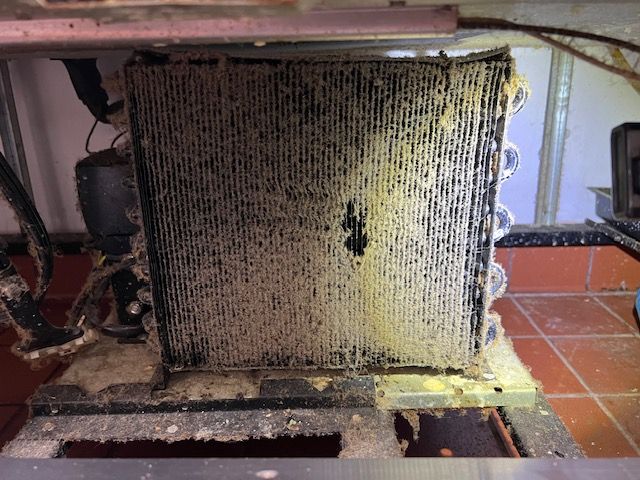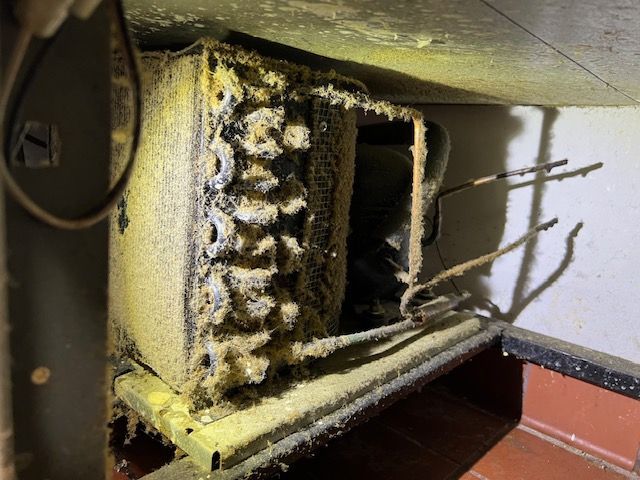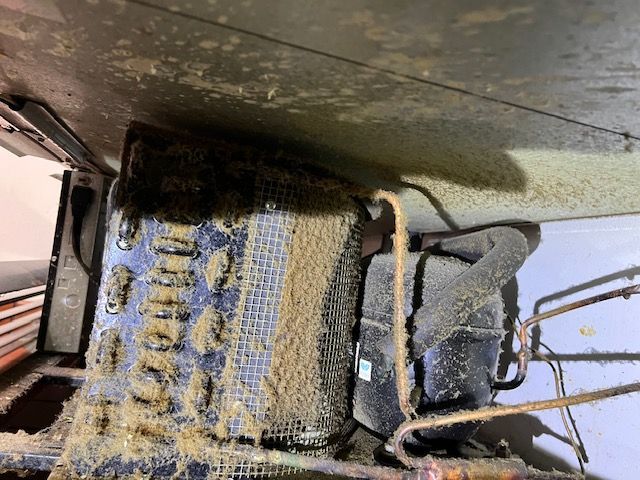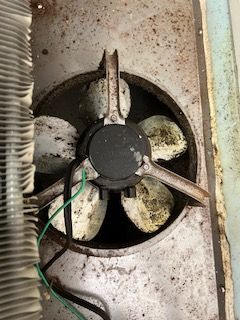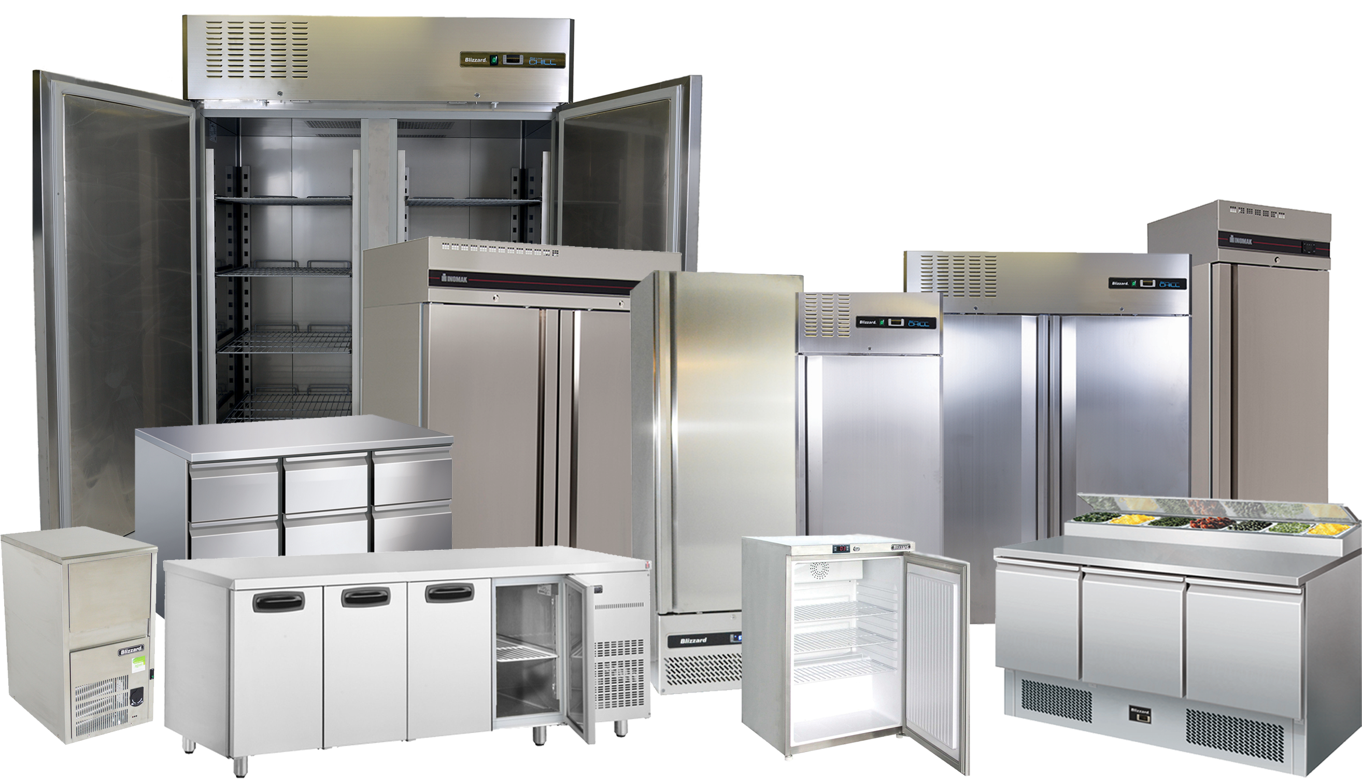
Commercial Reach-In Cooler, Freezer, Prep Table & Deli Display Tips
Expert Service for Restaurants, Cafeterias & Food Businesses Across Metro Atlanta
Don’t let refrigeration failures shut down your kitchen. At John’s Heating, Cooling, and Appliance Repair, we specialize in keeping commercial refrigeration systems running cold and clean across Atlanta, Fayetteville, Newnan, Peachtree City, Sharpsburg, Zebulon, and Griffin.
Whether you run a restaurant in The Avenue, Peachtree City, a deli in Fayetteville Pavilion, or a café near Downtown Newnan, we provide fast, expert reach-in cooler repair, reach-in freezer repair, prep table service, and deli display case maintenance to keep your business compliant and your ingredients safe.
Reach-In Coolers, Freezers, and Prep Stations Need Regular Attention
Commercial reach-in coolers, freezers, prep tables, and deli cases are the lifeblood of many kitchens — but when they malfunction, food safety, energy bills, and profits take a hit. Prevent major problems by knowing the signs of trouble and how to maintain your equipment.
Common Commercial Refrigeration Problems We Diagnose and Repair
At John’s Heating, Cooling, and Appliance Repair, we offer expert refrigeration repair services across Peachtree City, Fayetteville, Newnan, Atlanta, Zebulon, Griffin, and the surrounding areas. Whether it’s a walk-in freezer, reach-in cooler, deli case, or prep table, we fix all major issues that lead to food spoilage or system failure, including:
Temperature Control Issues
- Warm air blowing from the refrigerator while the compressor is running — often a refrigerant leak or compressor failure.
- The freezer or cooler is not reaching the target temperature.
- Liquids freeze at temperatures below 32°F.
- Compressor overheating caused by a failed condenser fan motor.
Ice & Frost Problems
- Evaporator coils can freeze due to a faulty defrost system or dirty coils.
- Excessive ice buildup even with a functional defrost cycle.
- The thermostat malfunction is causing the evaporator to cycle off and ice up.
- Ice forms inside due to worn or cracked gaskets or poor door seals.
Airflow & Fan Malfunctions
- Fans are working, but the unit is not cooling — typically due to blocked evaporator or condenser coils.
- Evaporator fan motor failure.
- Poor airflow from dirty coils blocks heat transfer.
Component Failures & Leaks
- Defective thermostats are causing freeze-ups or erratic cycling.
- Coil damage or leaks causing water pooling or refrigerant loss.
- Loose or worn-out gaskets and hinges allow air leaks or cause the door to sag.
- Faulty sensors, defrost timers, or control boards are causing inconsistent operation.
Preventative Checks You Shouldn’t Skip
- Listen for strange compressor or fan motor noises.
- Inspect and clean coils to avoid significant repairs.
- Tighten fasteners, check door alignment, and inspect all seals.
- Schedule regular refrigeration maintenance to avoid downtime.
Keep Your Reach-In Equipment Cooling Properly – 3 Must-Know Tips
1. Clean the Condenser Coil Regularly
Your condenser coil helps remove heat from your unit. Dust and debris block this process, overworking your compressor.
Use a shop vac or soft brush every 2–3 months to clean the coils behind or beneath your reach-in cooler, freezer, or prep table. Dirty coils can cause high pressure, system shutdowns, and ultimately lead to compressor failure.
2. Check Gaskets on Reach-In Doors and Prep Drawers
Worn-out door and drawer gaskets let warm air in and cold air out. This reduces efficiency and causes temperature spikes.
Inspect gaskets for
rips, gaps, or moisture buildup. A quick fix? Use low heat (similar to a blow dryer) to soften warped gaskets back into shape gently.
3. Drain Line and Pan Maintenance
A blocked drain line in your reach-in unit can lead to puddles of water under your cooler, mold growth, or unpleasant odors.
Every month,
clean the drain line and pan with warm, soapy water to prevent sludge buildup. A clean drain helps maintain stable humidity levels and prevents ice buildup.
Don’t Forget Your Prep Tables and Deli Cases
Prep Tables
Used in pizza shops, sandwich spots, and salad bars from Zebulon cafés to Atlanta kitchens, prep tables must maintain consistent top and drawer temperatures. Dirty fans, clogged coils, or damaged lids can cause cooling failure or food code violations. We offer full prep table repair, gasket replacement, and fan motor service across South Metro Atlanta.
Deli Display Cases
Deli cases showcase meat, cheese, or cold beverages in stores and market counters. If your deli case in Griffin or Sharpsburg is fogging up, stops cooling, or forming ice, call us immediately. We service all types of open-air and closed-glass deli display units, offering comprehensive cleaning, thermostat calibration, and defrost system repair services.
Schedule Reach-In or Prep Table Repair Today
At John’s Heating, Cooling, and Appliance Repair, we’re known for our fast response, accurate diagnostics, and honest pricing. Serving food businesses in:
- Atlanta (Midtown restaurants, Buckhead bars, West End cafés)
- Fayetteville (Fayette Pavilion food courts, Downtown eateries)
- Newnan (Ashley Park restaurants, hospital cafeterias)
- Peachtree City (The Avenue, Hwy 74 commercial plazas)
- Sharpsburg & Senoia (local bakeries and markets)
- Zebulon & Griffin (highway diners, church kitchens, and gas station delis)
Call us now for:
✅ Emergency Commercial Refrigeration Repair
✅ Preventative Maintenance on Reach-In Coolers & Prep Tables
✅ Deli Case Service & Display Cabinet Diagnostics
✅ Local, Experienced Technicians Who Know South Metro GA Kitchens
Need fast help? Call
678-603-7775 — available
24 hours a day, 7 days a week.
We’re a BBB-accredited, licensed, and trusted company across South Metro Atlanta.
Dirty Condenser Coils Can Destroy Your Coolers and Freezers
— Don’t Let That Happen!
When dirt and grease build up on your condenser coils, it blocks airflow and prevents the refrigerant from releasing heat properly — meaning the freon can’t change states as it should. This causes the compressor to work harder, overheat, and eventually fail. We see it all the time in restaurants and stores across Atlanta, Peachtree City, Newnan, Fayetteville, Sharpsburg, Senoia, and surrounding areas. A dirty coil today can turn into a burned-out compressor tomorrow — costing you thousands. Let us help you avoid unnecessary breakdowns with routine cleaning and maintenance.
Don’t Let a Simple Cleaning Be the Reason Your Cooler Fails
It’s amazing how many expensive refrigeration repairs in Atlanta, Peachtree City, Newnan, and nearby areas could’ve been avoided with something as basic as coil cleaning. When coils are clogged with dirt, your system runs hotter, longer, and less efficiently — all for no reason. A 15-minute cleaning can save you a $2,000 compressor. Don’t let neglecting a simple maintenance task be the reason your walk-in cooler or prep table goes down in the middle of a busy weekend.

